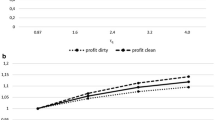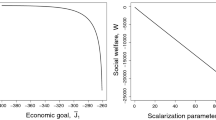Abstract.
In the presence of substantial relative-income effects and environmental disruption effects, economic growth may be welfare-reducing even if each and all individuals are optimizing and eagerly trying to make more money and the government also maximizes the welfare of individuals by the choice of income-tax rate and the ratio devoted to the abatement of environmental disruption. Welfare-reducing growth may be avoided if environmental disruption may be directed taxed at low costs and/or government spending on public goods is not environmentally disruptive.
Similar content being viewed by others
Author information
Authors and Affiliations
Additional information
Received: 2 September 1998/Accepted: 16 February 2000
Rights and permissions
About this article
Cite this article
Ng, S., Ng, YK. Welfare-reducing growth despite individual and government optimization. Soc Choice Welfare 18, 497–506 (2001). https://doi.org/10.1007/s003550000081
Issue Date:
DOI: https://doi.org/10.1007/s003550000081




